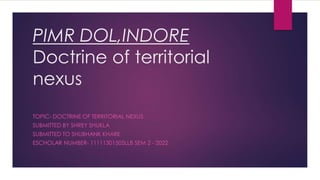Report
Share
Download to read offline

Recommended
Recommended
More Related Content
What's hot
What's hot (20)
Vicarious liability of state and sovereign immunity

Vicarious liability of state and sovereign immunity
Offences against the State under Indian Penal Code

Offences against the State under Indian Penal Code
CONTEMPORNEA EXPOSITIO EXTERNAL AID TO INTERPRETATION

CONTEMPORNEA EXPOSITIO EXTERNAL AID TO INTERPRETATION
ADM Jabalpur V. Shivkant Shukla Case Presesntation

ADM Jabalpur V. Shivkant Shukla Case Presesntation
Foreign Courts & Foreign Judgements under Civil Procedure Code in India.

Foreign Courts & Foreign Judgements under Civil Procedure Code in India.
Similar to Doctrine of territorial nexus
Similar to Doctrine of territorial nexus (20)
GOVERNMENT OF NCT OF DELHI VS UNION OF INDIA (2018) 8 SCC 501

GOVERNMENT OF NCT OF DELHI VS UNION OF INDIA (2018) 8 SCC 501
Concept of residence under income tax act (with the concept of dtaa and poem)

Concept of residence under income tax act (with the concept of dtaa and poem)
Financial relations between centre and state government

Financial relations between centre and state government
Suits filed by Aliens, by or against Foreign Rulers and Ambassadors

Suits filed by Aliens, by or against Foreign Rulers and Ambassadors
Recently uploaded
A thorough discussion of professional ethics for Bankruptcy Attorneys. It’s Not Easy Being Green: Ethical Pitfalls for Bankruptcy Novices

It’s Not Easy Being Green: Ethical Pitfalls for Bankruptcy NovicesLugenbuhl, Wheaton, Peck, Rankin & Hubbard
Recently uploaded (20)
Philippine FIRE CODE REVIEWER for Architecture Board Exam Takers

Philippine FIRE CODE REVIEWER for Architecture Board Exam Takers
The doctrine of harmonious construction under Interpretation of statute

The doctrine of harmonious construction under Interpretation of statute
It’s Not Easy Being Green: Ethical Pitfalls for Bankruptcy Novices

It’s Not Easy Being Green: Ethical Pitfalls for Bankruptcy Novices
Cyber Laws : National and International Perspective.

Cyber Laws : National and International Perspective.
A SHORT HISTORY OF LIBERTY'S PROGREE THROUGH HE EIGHTEENTH CENTURY

A SHORT HISTORY OF LIBERTY'S PROGREE THROUGH HE EIGHTEENTH CENTURY
Who is Spencer McDaniel? And Does He Actually Exist?

Who is Spencer McDaniel? And Does He Actually Exist?
Doctrine of territorial nexus
- 1. PIMR DOL,INDORE Doctrine of territorial nexus TOPIC- DOCTRINE OF TERRITORIAL NEXUS SUBMITTED BY SHREY SHUKLA SUBMITTED TO SHUBHANK KHARE ESCHOLAR NUMBER- 11111301505LLB SEM 2 - 2022
- 2. EVOLUTION The territorial operation of law is evolved in India in the Government of India Act, 1935 which was made by the British Parliament. Pre-Independence, it is dealt in the Government of India Act, 1935 which is applied to the territories in India. After independence, it is dealt with in the constitution of India.
- 3. MEANING The term territorial means the locality and nexus is the connection. The territorial nexus is dealt with under Art. 245 of the Constitution of India. Art. 245(1) states that Parliament may make laws for the whole or any part of the territory of India. The legislature of the State may make laws for the whole or any part of the State. The State Laws shall be void if there is extra-territorial operation. The laws made by the state legislature are not applicable outside the state except there is nexus between the state and the object. Art.245(2) deals with extra-territorial operations. The court cannot question the legislature on the validity of laws with regard to extra-Territorial operation. The subject-matter of distribution of legislative powers in respect to territory is dealt within the list under the 7th Schedule of the Constitution.
- 4. FEATURES • The Parliament is empowered to make laws within the territory of India and also extra-territorial aspects having nexus within the territory of India. • This doctrine is also applicable to the States. In taxing statutes, the sale or purchase is not necessary to be taken place within the territory of the state. • For the applicability of territorial nexus, the object need not be physically located within the territory of the state but must have sufficient territorial nexus with the state. • The tax can be levied by the state on a property, person or object not only within its territorial limits but also having sufficient territorial connection with it. The doctrine governs the taxation of non-residents in India.
- 5. CONDITIONS 1. The nexus must be legitimate. 2. The liability should be related to the territorial connection.
- 6. TO INVOKE THE DOCTRINE OF TERRITORIAL NEXUS 1. Whether there is the existence of extra-territorial operation in a particular state? 2. Whether there is a territorial nexus between the subject-matter of the Act and the state laws?
- 7. CASE LAWS Wallace V. Income Tax Commissioner, AIR 1948 PC 118. A company which was registered in England was a partner in a firm in India The Indian Income-Tax Authorities sough to tax the entire income made by the company. The Privy council applied the doctrine of territorial nexus and held the levy of tax valid. It said that the derivation from British India of major part of its income for a year gave to a company for that year sufficient territorial connection to justify its being treated as at home in India for all purposes of tax on its income for that year from whatever source income may be derived.
- 8. THANK YOU!